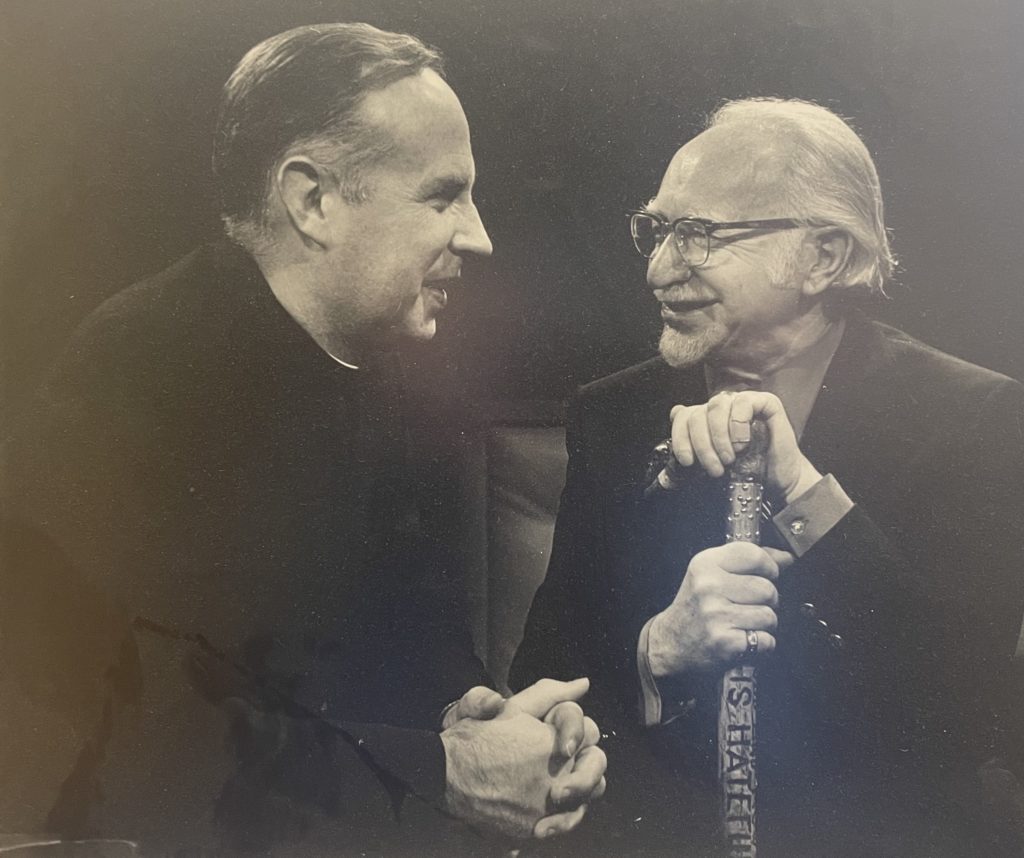
I have been thinking about our founding fathers, Rabbi Levine and Father Treacy, a lot over the last few years. They didn’t just feel love as a feeling – although both of them brought a lot of heart to their interfaith work together. They worked hard to discern real-world strategies to make love and respect in the human family more of a reality.
Consider these two strategies:
- Rabbi Levine saw anti-Catholic bigotry on the rise. He knew that it was just one more expression of dehumanization that has targeted many different groups, including his own Jewish community. In the context of the 1960’s, when there were only four TV channels, he and William Warren of KOMO TV created a TV show that put a Roman Catholic priest, a Rabbi, and a Protestant Pastor on the screen togather. They garnered 250,000 viewers per week. Further, they created a show in which the representative of each tradition was on an equal footing. Each brought the best of their tradition to the concerns and issues of the day. For those that could see it, they lifted up the possibility that we are in this together and that our diverse perspectives are a strength. They used this public expression of solidarity to engage with colleges, civic groups, and communities of wisdom to encourage greater respect, relationship, and partnership. That is a strategy.
- Rabbi Levine and Father Treacy saw that many communities of wisdom were not ready for multi-faith relationship, especially for relationship in public. Neither their leaders not the members of those communities were not ready. So what strategy can begin to create more social support? Levine and Treacy created an interfaith camp for youth. Their strategy was to create powerful relational experiences between youth, who would one day help lead their own communities of wisdom into more public partnerships.
As we witness the expressions that dehumanization is taking in our world today, and will likely be taking in the decades to come, we at PTU know that our response needs to be strategic too.
We are identifying some of large social trends in our region and across the country, that are putting communities at hightened risk of dehumanization, bigotry, and division. Among these are significant population growth and displacement by the effect of climate change, as well as increasing cultural and religious diversity in small towns and exurban areas that were previously more culturally homogeneous.
How do we prepare these communities for the changes they will experience? How do we spread the influence of multi-faith partnerships from large cities to more rural parts of the state? In a nutshell, our strategy will be to leverage
the power of local, wide-spread, face-to-face relationships, work for the common good, and publicly demonstrated solidarity.
We are currently in conversation with many local leaders of wisdom communities, interfaith partners, and other people working for peace and justice in their communities. We are discussing what this historical moment needs and refining our strategy based on the common trends we identify. This is a very exciting moment of growth and long-term strategic planning for PTU and much of the multi-faith community. We will be sharing our insights with you, and more information about the program we are planning in the next few months. So keep checking in here for updates.
It is important to love. It is also important to find ways for our love be expressed in a strategy that evokes love from so many hearts willing to share it.
